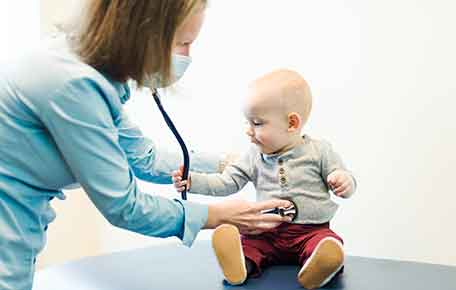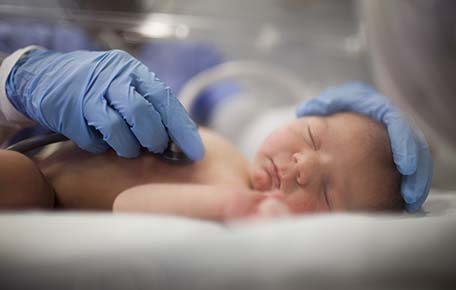No one wants to hear that their child’s heart is anything but perfect. But heart murmurs in children are common. Depending on your child’s other symptoms, they may need a pediatric cardiologist, like the ones at UVA Health Children’s.
Making sure your child’s heart is growing and developing correctly is important. We’re here to help.
Heart Murmur Diagnosis & Treatment at UVA Health Children’s
When your pediatrician hears an extra sound in your child’s heart, that’s called a murmur. In children, heart murmurs are actually pretty normal. Some estimate that nearly 67% of school-age children have some type of murmur.
Your doctor will listen to your child’s heart with a stethoscope. This will help them check important factors, like loudness, timing, and length. These answers will help them decide on possible next steps for your child.
To learn more about your child's heart murmur, your pediatrician may refer your child to a pediatric cardiologist, like the ones at UVA Health Children's.
Heart Murmur Diagnosis
At your appointment at UVA Health Children's, your doctor will talk to you about symptoms, family history, as well as checking your child's vitals. They'll also listen to your child's heart.
If they hear a murmur, they'll most likely order an echocardiogram. This is an ultrasound of the heart. By seeing how blood moves through the heart, they'll be able to determine where the murmur is and how likely it is to cause issues.
Depending on what is seen, they may also order chest x-rays, which can show any heart enlargement. Or an electrocardiogram, which measures the electrical activity of the heart.
Heart Murmur Treatment
Depending on the type of heart murmur detected, it’s possible your child won’t need any treatment. Innocent murmurs are harmless. Many kids will even grow out of their heart murmur.
To make sure your child’s murmur is harmless, your pediatrician may refer your child to a pediatric cardiologist. They can perform an echocardiogram to get a more detailed view of how your child’s heart is working. Even if your pediatrician doesn’t think it’s worth looking into, you can always ask for this referral for your piece of mind.
When a Heart Murmur Is a Problem
Pathologic murmurs are a bigger deal. They may show that there is a structural problem with your child’s heart.
These murmurs are usually louder, and sometimes sound like a click.
In children, pathologic murmurs are most likely to be related to a congenital heart disorder.
What Causes a Pathologic Murmur:
- Abnormal connections
- Problems with blood vessels
- Leaky heart valves
- Heart thickening
Surgery for Pathologic Heart Murmurs
Some of these issues may require surgery. UVA Health Children’s performs many of these procedures. By using advanced techniques, procedures like a PDA closure can be done in a minimally invasive way.
But even for more advanced surgeries, UVA Health Children’s is proud of our track record. We’ll continue to follow-up with your family and help you get through this challenging time.
Heart Murmur FAQs
Questions about your child’s specific murmur are best answered by your pediatrician. Here are answers to some of the most common questions.
Can My Child Play Sports with a Heart Murmur?
If your child has an innocent heart murmur, they can (and should!) do physical activities that they enjoy. This will help their heart grow and continue to be strong.
If your child has a pathologic murmur, you should talk with their pediatrician about their participation in sports.
Why Didn't Our Pediatrician Notice This Before?
It’s very common for murmurs to be missed during a regular checkup. That’s especially true if your child was crying or talking during the exam. Some murmurs are very soft, and it’s easier to hear them as the heart becomes larger.
Will My Child's Heart Murmur Stunt Their Growth?
An innocent murmur won’t affect your child’s growth or development. A pathologic murmur can lead to other issues, like failure to thrive, which could affect your child’s development. That’s why diagnosis and treatment is so important.


